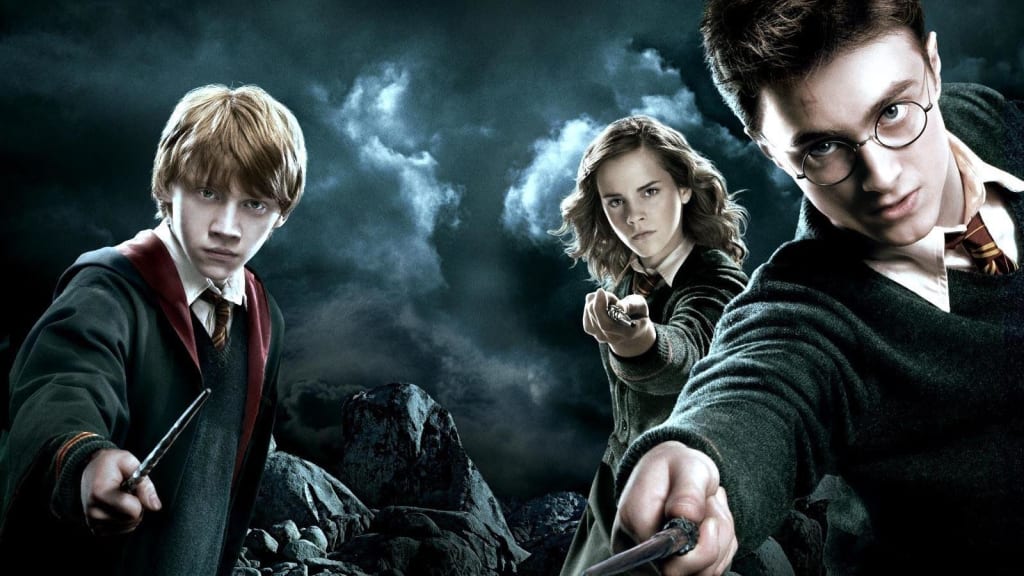
First, a confession: my name is Tom Bacon, I'm a committed Christian, and I absolutely love J. K. Rowling's Harry Potter franchise.
I know you've read countless tales of evangelical Christians who rail against the Harry Potter books, fearing them to somehow be an introduction to the Dark Arts; but I'm not too worried about that. I happen to think most people can differentiate between the real world and a fictional one. No, this particular article isn't an attempt to challenge the Harry Potter franchise in that way; rather, it's my attempt to show some of the themes and ideas in the books and films that, frankly, resonate rather well with my Christian faith.
These are elements of the Harry Potter franchise that I find remarkable, because — like all of the best fiction out there — I happen to believe they tap into certain transcendent truths. So, as a Christian, what do I make of Harry Potter?
Modern society's attitude towards the supernatural is largely influenced by the Enlightenment. An 18th-century movement, the Enlightenment encouraged rationalism in opposition to a belief in the supernatural. It was the dawn of the scientific age — where we're only supposed to accept that which we can see with our own eyes, where truths are scientifically proven and where belief is treated as a symptom of social immaturity.
Here's the fascinating thing, though; the majority of fantastical fiction assumes that the Enlightenment was wrong. Time and again, you see the idea of a hidden world beneath the surface of the one we know; a world that we 'Muggles' don't even glimpse. You can see that pattern everywhere you look, from Twilight to Shadowhunters — and most definitely in the world of Harry Potter, where the wizarding world is hidden from our 'Muggle' senses.
As a Christian, I find this fictional pattern to be fascinating. You see, I believe that there is indeed more to life than the Enlightenment would have us think. I believe we were made for a relationship with God, and that this desire runs through us all. So we look at the material world around us, and somewhere deep down we ask, "Is that it?"
For me, fiction represents a longing of the human spirit — a deep desire for there to be more to this world. I happen to believe that there is.
Our Actions Have a Spiritual Impact
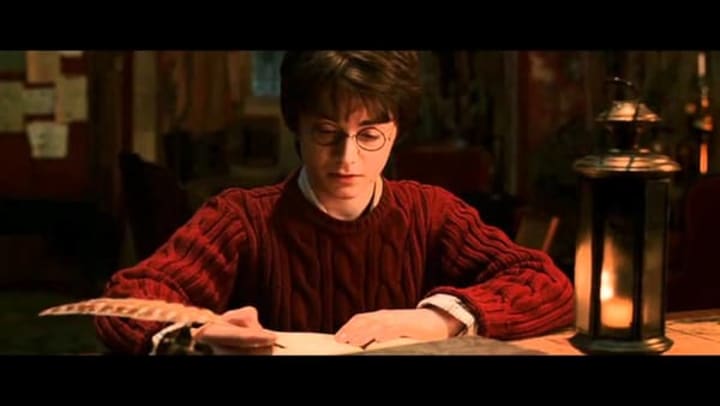
Tom Riddle's Diary.
The Harry Potter books happily assume one simple reality: that we human beings have a spirit; a soul if you like, one that lives on after death. Perhaps the most interesting side of this, though, is that — in J. K. Rowling's world — our actions do indeed have a spiritual impact.
This is most visible in Voldemort's Horcruxes. Horcruxes are powerful, unnatural things, where a dark sorcerer hides away a fraction of their own soul. In order to do this, though, the wizard first has to split their soul — and this is done by committing the most foul act: deliberately murdering another human being.
I'll admit that the Harry Potter franchise doesn't make much of this particular theme, but I find it to be an interesting one all the same. As a Christian, I do believe that our actions have a spiritual impact — that when we 'sin', we harm ourselves as much as anyone else. It's a minor detail, but a fascinating one.
The Fear of Death
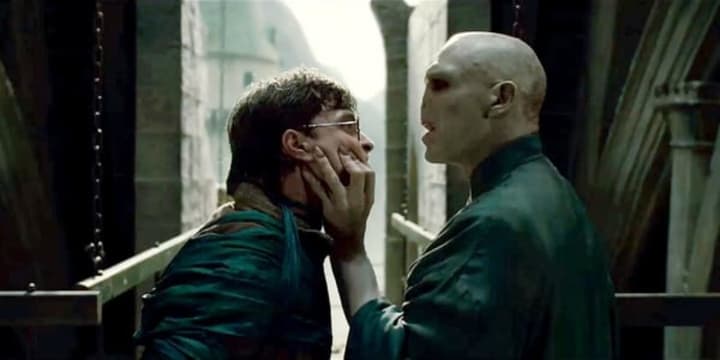
Voldemort faces Harry Potter.
Moving back to the major themes, though; in the Harry Potter world, death isn't the end — even if it is the thing Voldemort is most terrified of. It's no coincidence that he calls his followers 'Death Eaters' — and never forget the conversation between Dumbledore and Voldemort in The Order of the Phoenix:
“You do not seek to kill me, Dumbledore?” called Voldemort, his scarlet eyes narrowed. “Above such brutality, are you?”
“We both know that there are other ways of destroying a man, Tom,” Dumbledore said calmly. “Merely taking your life would not satisfy me, I admit —”
“There is nothing worse than death, Dumbledore!” snarled Voldemort.
“You are quite wrong,” said Dumbledore, speaking as lightly as though they were discussing the matter over drinks. “Indeed, your failure to understand that there are things much worse than death has always been your greatest weakness..”
Voldemort's fear of death is so very human. In his book An Alien at Saint Wilfred's, Christian writer Adrian Plass wrote a poem entitled "What do we do about death?" Here's a sample verse (you can check out the full poem here).
"What do we do about death?We don’t -The monster is hidden away.It's not in the zoo for the public to viewThe look on its face would empty the place.We don’t want to die, the people would cryDeath is the curse in the back of the hearseWe don’t need to see it today."
Where we simply try to avoid thinking about death, Voldemort obsesses over it. He relentlessly pursues a solution to death, ultimately choosing the path of Horcruxes in his bid to conquer his own mortality.
But Voldemort is not the true master of death; Harry is. Harry Potter's story begins with the death of his parents; his mother gives her life to protect him, and in so doing grants him a powerful mystical defence. Her sacrificial love was a greater force than even the Unforgivable Curse, and the curse rebounded upon Voldemort, nearly destroying him.
In The Deathly Hallows, this arc comes full-circle. Harry chooses to give up his own life for the sake of his friends; ironically, of course, Voldemort only succeeds in killing the fragment of his own soul contained within Harry's body. After a beautifully-crafted near-death experience, Harry returns to life — and, in the battle of Hogwarts that follows, we realize that Harry's sacrificial love now protects his friends. He gave his life for them; and now, Voldemort's curses cannot connect.
For dramatic reasons, this particular detail was omitted from the film version. It's a real shame, because in terms of the narrative, it's a beautiful arc.
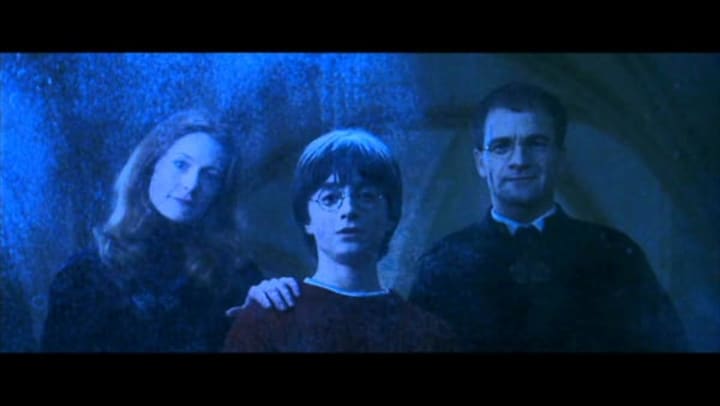
Harry sees his parents in the Mirror of Erised.
I can't help seeing a familiar pattern here, though. As a Christian, my faith is centered upon the idea of sacrificial love. I believe that God so loved the world that he gave his only begotten son, that whosoever believes in him may not perish but have eternal life. (Even better, I believe that eternal life begins with a relationship with God in the present; that we were made for God, and so are welcomed into a relationship beyond anything Enlightenment thinking would have us expect.)
But where Harry's blessing was for his friends, I believe God's blessing is freely available to anyone who believes. Where the heroes of Hogwarts had earned Harry's sacrificial love by their deeds, I don't believe we need to earn God's sacrificial love. What's more, just as in Harry's case, Jesus's sacrificial love resulted in the conquest of death. To return to Adrian Plass's poem:
"What do we do about death?We don’t -But once in the angry sunA winner was slain at the center of painWhen a battle was fought at the final resortBut because of the cross it was fought without lossAnd death is knife that will free us for lifeBecause of what Jesus has done."
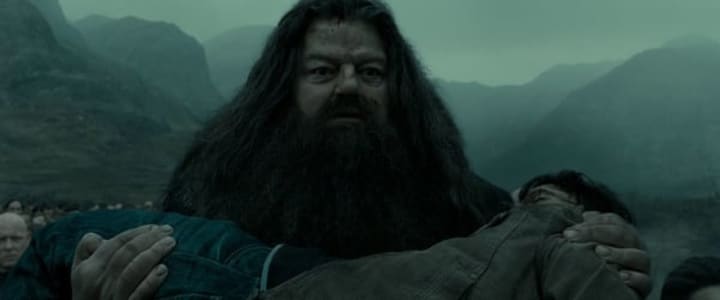
Hagrid carries Harry.
This particular theme is no accident. J. K. Rowling intended these parallels to be there; she makes that abundantly clear in The Deathly Hallows, when she explicitly quotes a verse from the Bible in order to set the themes of her last book in motion. Here it is:
"The last enemy to be defeated is death."
That's from 1 Corinthians 15: 26, and it speaks of Jesus's resurrection after his sacrificial death. Rowling's use of that verse is a deliberate thematic signpost, priming us to expect to see a sacrificial death and resurrection — which is just what we get.
I think it's a real shame many Christians shun the Harry Potter franchise. I love the books and films; J. K. Rowling is an amazing writer, and I have tremendous admiration for her creative skill. More than that, though, I find in the Harry Potter franchise messages and themes that really do resonate with me, and that frankly connect rather well to my Christian faith. Hopefully, now you can see why!
About the Creator
Tom Bacon
A prolific writer and film fan, Tom has a deep love of the superhero genre.






Comments
There are no comments for this story
Be the first to respond and start the conversation.